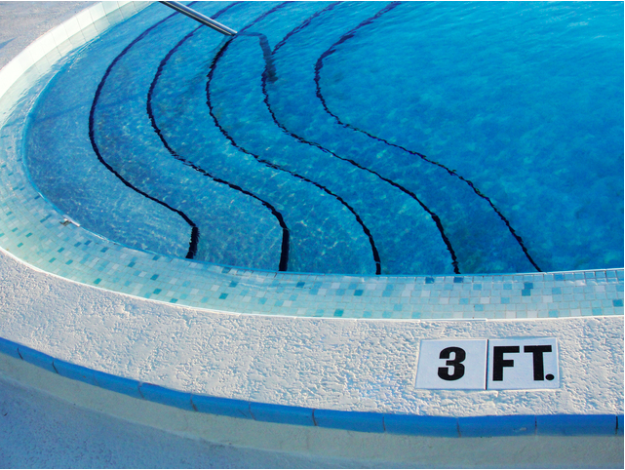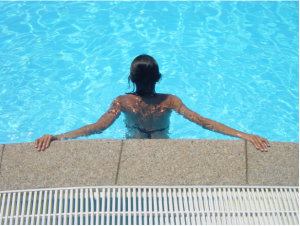
Now that pool season is here, it’s important to refresh yourself on pool cleaning chemicals and what they are responsible for. By using pool chemicals appropriately, you can maintain a sparkling clean pool all summer long! Additionally, balancing chemicals provides comfort to your swimmers and extends the lifespan of your pool surface and equipment.
Here is your simple guide to pool cleaning chemicals.
Testing the Water
- Test strips are a quick and easy way to test the pool water for sanitizer levels, pH and total alkalinity. By testing the water, you can also ensure that calcium levels are maintained and no metals are present.
Sanitizing the Pool
- Chlorine is the most popular way to sanitize a pool. It kills bacteria, keeps the water clean and is protected from sunlight degradation. Chlorine is also inexpensive and available in a variety of forms:
- 3” chlorinating tablets
- 1” chlorinating tablets
- Chlorinating sticks
- Chlorinating concentrate
- Bromine is another method for sanitizing your pool. Bromine lasts longer than chlorine and generally works better for warm spas and pools. However, it’s more expensive than chlorine and not available in all markets.
Shocking the Pool
- Shocking the pool needs to be done on a regular basis to keep the pool water clear and clean. Waste and bacteria is continually added to the pool water from swimmers and the natural environment. In order to prevent algae and cloudy water, shocking the pool is critical.
- The “shocking” process involves chlorine combining with bacteria during the sanitization process. The chlorine level is significantly raised in the pool for a short time. The combined chlorine is then burned up, returning the chlorine to normal levels.
Preventing Algae
- Preventing algae is an important step in maintaining your pool water. Algae grows when there is a lack of circulation, imbalanced water chemistry or low sanitizer levels. Even with the proper precautions, algae can still grow.
- Algaecides act as backups to your normal sanitization process. Add algaecide after shocking your pool.
Other Chemicals
- Other chemicals are available for treating specific issues such as calcium hardness, pH balance, alkalinity and metals. By testing your water regularly, you can determine if any of these issues need attention.
Always talk to your pool professional for advice. They can tell you which type of chlorine is best for your pool as well as other types of chemicals that are needed to keep your pool water clean, safe and healthy. If you live in the area, Paradise Pools will be happy to provide you with FREE water testing! Bring in a sample once a month and start saving money!

Now that you’re a pool owner, you want that sparkling clean water that the neighbors envy. Yet how do you achieve this crystal clear water when you don’t have the time to vacuum it? Hiring a pool maintenance service is one idea, but a more budget-friendly option is purchasing an automatic pool cleaner.
What is an Automatic Pool Cleaner?
There are three types of pool cleaners: pressure-side pool cleaners, robotic pool cleaners and suction-side pool cleaners. Each one has unique benefits, but all have the same goal: to keep your swimming pool clean while taking some of the burden off you.
Let’s take a closer look at the three automatic pool cleaners and which one is recommended by Paradise Pools.
Pressure-Side Pool Cleaners
Pressure-side pool cleaners tend to be the most popular because they can clean large debris, they are durable and easy to take care of and they don’t push the debris into the filter or pump basket.
To work, pressure-side pool cleaners use pressure from your pool’s pump and filter. The water pressure moves the wheels around to push out the cleaner, and the jets create a water vortex. Dirt and debris are lifted into the filter bag.
Robotic Pool Cleaners
Robotic pool cleaners are the best by our standards. However, they are also the most expensive. Robotic cleaners are effective at cleaning large and small debris. They also circulate the pool water when your filter isn’t running and scrub your tile lines and pool wall.
Powered by an electric motor and pump, robotic cleaners connect to a low-voltage transformer that plugs into one of your outdoor outlets. The cleaner lifts up debris into the filter bag through its pump, so it doesn’t rely on your filter system.
Some newer robotic pool cleaners contain a computer chip that tracks activity and helps you to be more efficient with cleaning your pool. It’s a great way to save time and money.
Suction-Side Pool Cleaners
One last automatic pool cleaner is a suction-side pool cleaner. This cleaner uses suction from your skimmer to move around your pool and clean up debris. It’s essentially a vacuum that moves on its own, and it needs your pool system for power and filtration. If you are on a low budget, a suction-side pool cleaner can work. However, they are not our first recommendation.
What Does Paradise Pools Recommend?
If your budget allows, we highly recommend a robotic pool cleaner. Specifically, the Hayward TigerShark Series that uses less energy, doesn’t require an extra pump and includes Quick Clean Technology. Some models even clean in between the tile lines for you!
If you’re on a budget, we suggest a pressure-side cleaner from Pentair. This cleaner is highly efficient and can handle both small and large debris. It’s also more affordable compared to the robotic pool cleaners.
If you have any questions about automatic pool cleaners and how they can help you, call Paradise Pools. Also inquire about our simple, affordable pool maintenance services that will keep your pool sparkling clean for you!


 CALL US TODAY!
CALL US TODAY!




